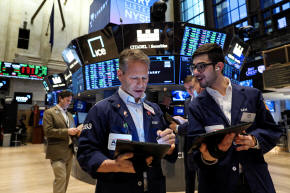'Mystifying' U.S. stock rally defies economic unease
 Send a link to a friend
Send a link to a friend
 [March 30, 2022] By
Lewis Krauskopf [March 30, 2022] By
Lewis Krauskopf
NEW YORK (Reuters) -As a stunning rebound
in U.S. stocks charges on, investors are questioning how long the surge
can continue in the face of a hawkish Federal Reserve, warnings of
recession from the bond market and geopolitical uncertainty.
The S&P 500 is up 11% since March 8, its biggest 15-day percentage gain
since June 2020, led by many of the high-growth stocks that have been
pummeled for much of the year. The benchmark index has cut its
year-to-date losses to 2.8%, after it earlier swooned by as much as
12.5%.
The move has come despite a broad range of concerns that rocked equities
earlier this quarter, among them the war in Ukraine, surging inflation
and a sharp rise in Treasury yields fueled by tightening monetary policy
from the Fed.
Stocks shrugged off the latest ominous sign from the bond market on
Tuesday. The S&P 500 closed up 1.2% even as the widely tracked U.S.
2-year/10-year Treasury yield curve inverted for the first time since
September 2019, a phenomenon that has reliably predicted past
recessions.

"It's been mystifying," said Jack Ablin, chief investment officer at
Cresset Capital Management. "I think that the bond market is sober and
the equity market is quixotic."
Investors are pointing to a number of factors that could be driving the
bounce in equities.
Many have taken heart from Fed Chairman Jerome Powell's assessment of
the U.S. economy as strong enough to handle an aggressive pace of rate
increases and may be cheering a Fed that now appears to be tackling
sky-high inflation head on, analysts said.
The S&P 500 has gained over 6% since the Fed's March 16 monetary policy
meeting, at which it raised interest rates by 25 basis points and
penciled in 150 basis points of tightening for the rest of the year.
"While stock investors love low interest rates, they don't love an
inflationary environment that gets out of control," said J. Bryant
Evans, investment advisor and portfolio manager at Cozad Asset
Management.
Recent weeks have also seen institutional investors driving up prices as
they unwind so-called "short" bets against equities, analysts at Goldman
Sachs said in a recent report.
At the same time, individual investors have been using the weakness in
stocks as an opportunity to buy, the bank said.
According to Goldman, $93 billion of capital has flowed into U.S. equity
funds since the start of the year, "suggesting that households have
continued to buy after the record year for U.S. equity inflows in 2021."

[to top of second column] |

Traders work on the floor of the New York Stock Exchange (NYSE) in
New York City, U.S., March 29, 2022. REUTERS/Brendan McDermid

Indeed, many of the stock rally's biggest gainers have come in
high-growth, retail investor favorites that had been hammered as bond
yields shot higher earlier this year. Those include so-called meme stock
darlings GameStop and AMC Entertainment Holdings, whose prices have more
than doubled from their 2022 lows, and Cathie Wood's ARK Innovation fund
ETF, which is up 36.5% from its recent low.
Strategist Ed Yardeni of Yardeni Research said March 8 may have marked a
bottom for the stock market this year, believing stocks are gaining
support from investors using equities as a hedge against inflation,
which stands at its highest level in nearly four decades.
"The fog of war had masked the outlook, but the long-term bull market,
punctuated by panic attacks, remains intact," he wrote on Tuesday.
The corporate earnings outlook also remains solid, even as higher energy
and other prices threaten to erode profit margins. Estimates for S&P 500
profits have risen since the start of the year with companies overall
expected to increase earnings by 8.8% in 2022, according to Refinitiv
IBES.
"Stocks were knocked down, but earnings estimates just kept going up,"
said Matthew Miskin, co-chief investment strategist at John Hancock
Investment Management. "Investors are hesitant to really unload on
stocks here as the earnings and economic picture looks still very
favorable."

Another factor may be investors adjusting their portfolios as the
quarter winds down, strategists at JPMorgan said. Investor rebalancing
of portfolios "likely played a major role over the past two weeks,
hurting bonds and supporting equities," they wrote.
Plenty of investors are suspicious of the rebound. Neuberger Berman said
on Monday it was looking to "fade" equity rallies.
"High inflation, rising rates and slowing growth is a potentially
poisonous mix for equity investors," Erik Knutzen, chief investment
officer, multi-asset class, at Neuberger said in a written commentary.
Robert Pavlik, senior portfolio manager at Dakota Wealth Management,
said he was holding slightly higher than normal cash levels in client
portfolios.
"I am wary that this is a bear market rally that could turn around and
that we could re-test the lows," Pavlik said.
(Reporting by Lewis Krauskopf; Editing by Ira Iosebashvili and Richard
Pullin)
[© 2022 Thomson Reuters. All rights
reserved.]This material may not be published,
broadcast, rewritten or redistributed.
Thompson Reuters is solely responsible for this content. |